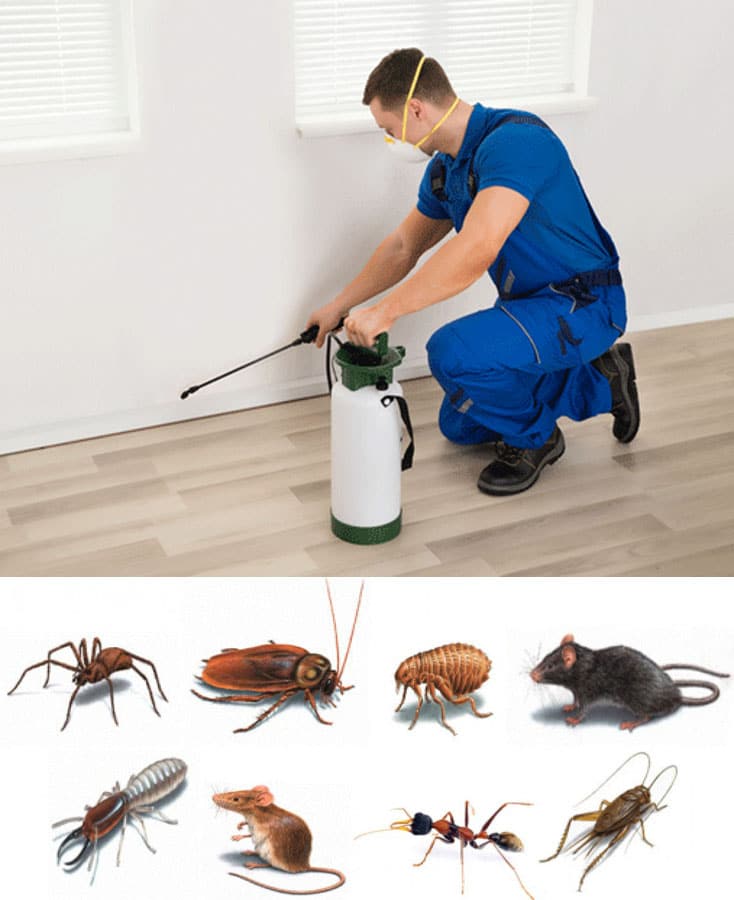Experienced A1 Exterminators Charlotte NC - Fast and Reliable Solutions
Experienced A1 Exterminators Charlotte NC - Fast and Reliable Solutions
Blog Article
Bed Insect Treatment Failure: Comparing Chemical Vs. Non-Chemical Solutions
In the world of insect control, specifically when taking care of the persistent problem of bed pests, the choice between chemical and non-chemical treatment options can be a critical one. Both strategies supply distinct advantages and drawbacks, affecting elements such as performance, safety and security factors to consider, and overall expense. By analyzing the nuanced information of each method, a more clear understanding of which path to pursue in resolving a bed pest infestation can be obtained.
Performance of Chemical Therapies
Chemical treatments for bed bug problems have actually been widely recognized for their powerful and rapid effectiveness in getting rid of these insects. When considering the efficiency of chemical treatments, it is critical to comprehend that they can give a complete and fast remedy to a bed bug problem. Specialist pest control specialists often count on insecticides to target bed insects at various phases of their life cycle, including eggs, fairies, and adults. These chemicals commonly work by disrupting the bed bugs' nerves, causing paralysis and ultimate death.
Moreover, chemical treatments have the benefit of using recurring effects, meaning that they can remain to eliminate bed bugs also after the preliminary application. This residual action is particularly advantageous in combating any possible re-infestations. Furthermore, the quick activity of chemical therapies can bring relief to people facing serious bed bug invasions, allowing them to restore control of their living areas quickly.
Security Interest In Chemical Solutions
One crucial aspect that calls for cautious consideration when making use of chemical remedies for bed pest treatment is making sure the safety and security of occupants and the atmosphere. Direct exposure to specific chemicals made use of in bed pest treatments can lead to respiratory system issues, skin irritability, or various other negative reactions, particularly in individuals with pre-existing problems or sensitivities.
Additionally, the environmental effect of chemical solutions is another substantial consideration. Some chemicals utilized in bed pest treatments might be unsafe to helpful insects, wild animals, and environments if they leach right into the soil or water systems. It is necessary to utilize chemical therapies deliberately, adhering to security guidelines, and considering much less poisonous options to mitigate these risks and make certain the effective and risk-free management of bed pest infestations.
Benefits of Non-Chemical Methods
Taking into consideration the possible safety issues and environmental influence linked with chemical options for bed bug treatment, exploring non-chemical approaches provides a promising choice with numerous unique benefits. Non-chemical therapies are ecologically friendly, as they do not add to air or water contamination, making them a lasting option for insect control.
Furthermore, non-chemical remedies can be effective in targeting bed bugs, including hard-to-reach locations where chemical therapies may not pass through. Approaches such as warm therapy, vacuuming, vapor cleansing, and mattress coverings give thorough eradication without using hazardous chemicals. Furthermore, non-chemical methods can be click to find out more much less disruptive, needing very little preparation and permitting quicker reentry into dealt with areas. Overall, going with non-chemical bed pest treatment techniques not just prioritizes safety and ecological security yet also makes certain detailed and reliable insect control.
Limitations of Non-Chemical Treatments

In addition, non-chemical treatments typically require multiple applications to achieve effective removal. This can be time-consuming and may not always assure complete elimination of all bed bugs and their eggs, specifically in concealed or hard-to-reach areas.
In addition, the success of non-chemical therapies heavily depends on correct application and thoroughness, which can be testing for people without professional proficiency. Insufficient application of non-chemical approaches might result in insufficient obliteration, leading to consistent invasions and the need for extra therapies.
Therefore, while non-chemical treatments have their advantages, it is necessary to recognize these limitations and consider them when establishing one of the most effective technique for managing bed insect invasions.
Expense Comparison: Chemical Vs. Non-Chemical Options
Given the limitations connected with non-chemical treatments, an important aspect to examine in the context of bed insect monitoring is the expense contrast in between chemical and non-chemical options. In contrast, non-chemical therapies like warm therapy or heavy steam can be extra costly, with prices varying from $1,000 to $6,000 for a whole home. While the initial price of chemical treatments may appear lower, numerous treatments may be needed to fully eradicate the invasion, possibly increasing the general price.
Verdict

Taking into consideration the prospective safety and security concerns and environmental impact connected with chemical remedies for bed bug treatment, discovering non-chemical techniques provides a promising option with several unique advantages.Offered the restrictions associated with non-chemical therapies, an essential facet to assess in the context of bed pest management is the expense comparison in between chemical and non-chemical alternatives. In comparison, non-chemical treatments like warm therapy or vapor can be much more expensive, with expenses varying from $1,000 to $6,000 for a whole home. While the first cost of chemical treatments may seem lower, several therapies might be called for to completely get rid of the problem, possibly increasing the overall expense.In final thought, when contrasting chemical and non-chemical bed pest therapy alternatives, it is necessary to think about effectiveness, security, benefits, constraints, and expense.
Report this page